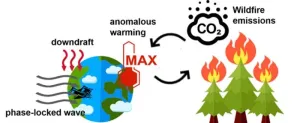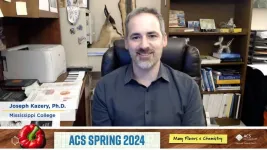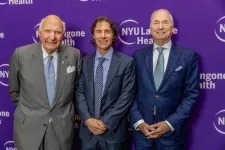(Press-News.org) Research Highlights:
After 16 weeks of free, weekly home delivery of fresh produce, study participants boosted their fruit and vegetable consumption by almost ½ of a serving per day and added 42 minutes to their weekly level of physical activity.
One year later, participants had better blood sugar control and lower bad cholesterol levels compared to adults who did not receive free, weekly produce deliveries.
The study found that adults who participated in the free, weekly produce program had improved cardiovascular health measures.
Embargoed until 8:30 a.m. CT/9:30 a.m. ET, Wednesday, March 20, 2024
CHICAGO, March 20, 2024 — Programs that provided free, weekly home delivery of fresh fruits and vegetable from local farms helped improve recipients’ nutrition levels, physical activity levels and cardiovascular disease risk factors, according to preliminary research to be presented at the American Heart Association’s Epidemiology and Prevention│Lifestyle and Cardiometabolic Scientific Sessions 2024, held March 18- 21, in Chicago. The meeting offers the latest science on population-based health and wellness and implications for lifestyle.
“We all know that eating healthier foods, like fruits and vegetables, is good for you, however, sometimes we focus too much on finding a simple solution rather than taking small, preventative measures to improve health,” said lead study author Lisa Goldman Rosas, Ph.D., M.P.H., an assistant professor in the department of epidemiology and population health and the department of medicine at Stanford School of Medicine in Palo Alto, California. “’Food as Medicine’ programs, such as the Recipe4Health program we studied, aim to shift the focus to ensuring a healthy diet including fresh fruits and vegetables is consistently accessible and affordable to all people to help improve health outcomes.”
Recipe4Health is a program in Alameda County, California, that provided free, weekly deliveries of locally grown produce to adults who received health care at one local Federally Qualified Health Center. For 16 weeks, participants received free home delivery of approximately 16 servings of fresh fruits and vegetables. The health centers are federally funded, nonprofit facilities providing health care to people in communities that are medically underserved.
Researchers surveyed participants about their diet, physical activity and their level of food insecurity before and after the 16-week program of free produce delivery. To assess food insecurity, the questions included, for example, how often they run out of food and how often they lack money to buy more food.
Analysis of the participants’ survey responses found that at the end of the 16-week free produce program, they had:
increased their fruit and vegetable consumption by almost ½ of a serving per day;
increased their physical activity by almost 42 minutes per week; and
less food insecurity – decreasing from 59% reporting food insecurity at enrollment to 48% after the 16-week program ended.
The American Heart Association recommends that individuals consume four to five servings of vegetables and fruits each day and engage in at least 150 minutes of moderate intensity physical activity each week.
“I was really excited to see that providing patients with a modest amount of locally grown produce resulted in improvements in food insecurity, diet and indicators of cardiovascular health. This study took place during the COVID-19 pandemic, when many of these outcomes were worsening, especially among patients receiving care at Federally Qualified Health Centers that were disproportionately impacted,” Rosas said.
In a second analysis, researchers analyzed changes in cardiovascular disease risk factors one year after the free, fresh produce program began, which ended after 16 weeks. When comparing Recipe4Health participants with adults receiving care at other Federally Qualified Health Centers in the same county that had not instituted the free produce deliveries, researchers found that, after one year, participants in the free produce program had:
Significantly higher reductions in non-HDL cholesterol (total cholesterol minus “good” high-density lipoprotein cholesterol); the average reduction of non-HDL cholesterol was 17.1 mg/dL. According to the American Heart Association, an optimal total cholesterol level is about 150 mg/dL, with levels of low-density lipoproteins (“bad” cholesterol) at or below 100 mg/DL.
Participants in the free produce delivery program had an average reduction in HbA1c levels of 0.37%, a reduction lower than what might be seen with a Type 2 diabetes medication in the same time frame, Rosas noted. A healthy range for the level of A1c in hemoglobin is 4% to 5.6%, with a range of 5.7% to 6.4% indicating prediabetes and levels above 6.5% indicating Type 2 diabetes.
There were no notable changes in blood pressure or body mass index among the produce program participants.
“It is possible that additional strategies are needed to change body mass index and blood pressure. Additional strategies may include behavioral interventions and pharmacotherapy in conjunction with a Food as Medicine program,” Rosas said.
Study details and background:
Researchers analyzed health information for 5,286 adults in Alameda County, California, half of whom participated in the Recipe4Health program; the average age was 51 years.
Approximately 68% of participants self-identified as women, and 32% self-identified as men. 51% of participants self-identified as Latinx adults, 21% self-identified as Black adults, 11% self-identified as white adults, 8% self-identified as Asian American/Pacific Islander adults, 6% identified as unknown race/ethnicity and 2.5% identified as mixed-race/ethnicity adults. (Percentages do not add up to 100% due to rounding.)
All participants received medical care at a Federally Qualified Health Center in Alameda County, California.
Coronary artery disease had already been diagnosed in 45% of participants when they enrolled, and about half of total study participants had been diagnosed with high cholesterol.
Some of the Federally Qualified Health Centers implemented the Recipe4Health program to provide 16 free, weekly home deliveries of fresh local produce.
Using electronic health records, changes in cardiovascular disease risk factors over a year were compared between Recipe4Health participants and similar patients, matched for several demographic and health characteristics, receiving care at centers not participating in the Recipe4Health program
The study had several limitations including small sample sizes for some of the blood test measures, since many participants did not visit the lab during the pandemic. Additionally, findings about diet and physical activity levels were from surveys completed by Recipe4Health program participants, however, this information was not collected from a control group.
The researchers noted that their future work will involve exploring different strategies for delivering food, evaluating the effects of medically supportive groceries (foods that are approved by a registered dietitian or nutritionist), engaging diverse patient groups, such as those with Type 2 diabetes or cancer, people who live in rural areas and children.
The Association is working to improve access to healthy food among people receiving treatment for chronic health conditions and people at high risk for such conditions. The Association’s Health Care by FoodTM initiative is investing in research, advocacy and education to show clinical benefit and cost effectiveness of interventions that use food as medicine are covered by public and private health insurance.
“This research demonstrates the potential for a food prescription, accessible through a health care visit, to improve health outcomes for significant portions of the U.S. population,” said Kevin Volpp, M.D., Ph.D., the Mark V. Pauly Professor at the Perelman School of Medicine and the Wharton School, director of the Penn Center for Health Incentives and Behavioral Economics and research lead for the Association’s Health Care by FoodTM initiative. “A coordinated research approach is needed to more systematically and rigorously define how well food is medicine interventions prevent and treat disease compared to standard medical care.”
Co-authors, their disclosures and funding sources are listed in the abstract.
Statements and conclusions of studies that are presented at the American Heart Association’s scientific meetings are solely those of the study authors and do not necessarily reflect the Association’s policy or position. The Association makes no representation or guarantee as to their accuracy or reliability. Abstracts presented at the Association’s scientific meetings are not peer-reviewed, rather, they are curated by independent review panels and are considered based on the potential to add to the diversity of scientific issues and views discussed at the meeting. The findings are considered preliminary until published as a full manuscript in a peer-reviewed scientific journal.
The Association receives funding primarily from individuals; foundations and corporations (including pharmaceutical, device manufacturers and other companies) also make donations and fund specific Association programs and events. The Association has strict policies to prevent these relationships from influencing the science content. Revenues from pharmaceutical and biotech companies, device manufacturers and health insurance providers and the Association’s overall financial information are here.
Additional Resources:
Multimedia is available on the right column of the release link https://newsroom.heart.org/news/free-weekly-fresh-produce-improved-diet-physical-activity-and-reduced-cvd-risk-factors?preview=8e40c1c58aacb3e59747ed237c666189
After March 20, view abstract 21 in the EPI│ Lifestyle 2024 Online Program Planner.
AHA news release: Targeted scientific research projects to demonstrate effectiveness of ‘food is medicine’ in health care (January 2024)
AHA news release: Free Weekly Produce Delivery Improved Blood Sugar, Food Security in Low-Income Adults (Nov. 2023)
AHA news release: Research, advocacy, education urged to address chronic disease through Food Is Medicine programs (Sept. 2023)AHA news release: Prescription for fruits, vegetables linked to better heart health, food security (August 2023)
AHA news release: Food insecurity linked to increased heart risks for people with peripheral artery disease (Oct. 2022)
AHA news release: Lack of access to healthy food may raise risk of death from heart failure (Oct. 2022)
For more news from AHA EPI│ Lifestyle Scientific Sessions 2024, follow us on X (formerly Twitter) @HeartNews, #EPILifestyle24.
###
The American Heart Association’s EPI│Lifestyle Scientific Sessions 2024 is the world’s premier meeting dedicated to the latest advances in population-based science. EPI│Lifestyle Scientific Sessions 2024 is in-person only, Monday through Thursday, March 18-21 at the Hilton Chicago. The primary goal of the meeting is to promote the development and application of translational and population science to prevent heart disease and stroke and foster cardiovascular health. The sessions focus on risk factors, obesity, nutrition, physical activity, genetics, metabolism, biomarkers, subclinical disease, clinical disease, healthy populations, global health and prevention-oriented clinical trials. The Councils on Epidemiology and Prevention and Lifestyle and Cardiometabolic Health (Lifestyle) jointly planned the EPI│Lifestyle Scientific Sessions 2024. Follow the conference on Twitter at #EPILifestyle24.
About the American Heart Association
The American Heart Association is a relentless force for a world of longer, healthier lives. We are dedicated to ensuring equitable health in all communities. Through collaboration with numerous organizations, and powered by millions of volunteers, we fund innovative research, advocate for the public’s health and share lifesaving resources. The Dallas-based organization has been a leading source of health information for a century. During 2024 - our Centennial year - we celebrate our rich 100-year history and accomplishments. As we forge ahead into our second century of bold discovery and impact, our vision is to advance health and hope for everyone, everywhere. Connect with us on heart.org, Facebook, X or by calling 1-800-AHA-USA1.\
END
Free, weekly fresh produce improved diet, physical activity and reduced CVD risk factors
American Heart Association Epidemiology, Prevention, Lifestyle & Cardiometabolic Health Conference, Abstract 21
2024-03-20
ELSE PRESS RELEASES FROM THIS DATE:
Electronic waste rising five times faster than documented e-waste recycling: UN
2024-03-20
Geneva / Bonn - The world's generation of electronic waste is rising five times faster than documented e-waste recycling, the UN's fourth Global E-waste Monitor (GEM) reveals today.
The 62 million tonnes of e-waste generated in 2022 would fill 1.55 million 40-tonne trucks, roughly enough trucks to form a bumper-to-bumper line encircling the equator, according to the report from ITU and UNITAR.
Meanwhile, less than one quarter (22.3%) of the year's e-waste mass was documented as having been ...
JAMA Network names new editor in chief of JAMA Network Open
2024-03-20
Chicago, March 20, 2024 – Eli Perencevich, M.D., M.S., has been named the Editor in Chief of JAMA Network Open. Dr. Perencevich is the Associate Chair for Clinical and Health Services Research and Professor of Internal Medicine at the University of Iowa Carver College of Medicine, and the Director of the Center for Access & Delivery Research and Evaluation (CADRE) at the Iowa City VA Medical Center.
With over 20 years of experience studying the epidemiology and outcomes of hospital-acquired infections using mathematical ...
Scientists uncover a causal relationship between remote extreme heat and the Canadian wildfires in 2023
2024-03-20
Wildfires are events that can have significant impacts on ecosystems and human society. In the context of global warming, there has been a notable surge in the frequency and ferocity of wildfires in the Northern Hemisphere over recent years. In 2023, Canada experienced an unprecedented wildfire event, with CO2 emissions increasing by 527.1% over the average of 2001–2022 during the months of May–August. The burned area was more than 6–7 times larger than in a normal year. Notably, both Canada and more than 15 states in the northeastern ...
Crawfish could transfer ionic lithium from their environment into food chain
2024-03-20
NEW ORLEANS, March 20, 2024 — From cell phones to watches to electric cars, lithium-ion rechargeable batteries power a plethora of devices. The increased use of this technology means more lithium could find its way into the environment as consumers discard electronic products. Now, researchers describe how lithium can accumulate in a common Southern crustacean: the crawfish. As the season for catching and eating mudbugs comes into full swing, the researchers’ findings highlight the potential implications for public health and the environment.
The researchers will present ...
Teaching teenagers to understand their feelings is key to life-long resilience, psychologist says
2024-03-20
Helping teenagers to understand what is going on inside their own brains is the key to helping them mature into resilient and independent adults, research suggests.
Sheila Redfern, a consultant clinical child and adolescent psychologist, proposes that rather than focusing on stamping out difficult behaviours, parents should teach teenagers to manage their feelings and relationships in safe ways.
Dr. Redfern says that although parenting teenagers is uniquely challenging, with concerns about social media use, self-harm, ...
Visionary $15 million gift from Wayne & Wendy Holman to NYU Langone Health ensures continued excellence in newly named Holman Division of Endocrinology, Diabetes & Metabolism
2024-03-20
NYU Langone Health has received a $15 million gift from innovators and philanthropists Wayne G. Holman, MD, and Wendy Holman to further elevate the world-class treatment and study of endocrine disorders in the newly named and endowed Holman Division of Endocrinology, Diabetes & Metabolism.
“Wayne and Wendy’s generosity in this important area of medicine will help NYU Langone further enhance our exceptional research, education and clinical care within the Holman Division of Endocrinology, ...
Rural and minority dementia patients face disparities in access to neurologists
2024-03-20
SPOKANE, Wash.—Getting dementia diagnosed can be a long and difficult process for anyone, but some may face additional challenges based on race or ethnicity and where they live, according to a study led by Washington State University researchers.
The study of nearly 95,000 Washington state residents found that people living outside of urban areas as well as Native American and Hispanic people face longer travel distances to be seen by neurologists. The researchers said these disparities could be contributing to delayed diagnoses, which can result in higher costs of care, ...
Fish fed to farmed salmon should be part of our diet, too, study suggests
2024-03-20
Paper available at: https://drive.google.com/drive/folders/144cIFPtY2VSaqV8AfFHy_hh6xlDcLShy?usp=sharing
The public are being encouraged to eat more wild fish, such as mackerel, anchovies and herring, which are often used within farmed salmon feeds. These oily fish contain essential nutrients including calcium, B12 and omega-3 but some are lost from our diets when we just eat the salmon fillet.
Scientists found that farmed salmon production leads to an overall loss of essential dietary nutrients. They say that eating more wild ‘feed’ species directly could benefit our health while reducing aquaculture demand for finite marine resources.
Researchers analysed ...
AI ethics are ignoring children, say Oxford researchers
2024-03-20
Researchers from the Oxford Martin Programme on Ethical Web and Data Architectures (EWADA), University of Oxford, have called for a more considered approach when embedding ethical principles in the development and governance of AI for children.
In a perspective paper published today in Nature Machine Intelligence, the authors highlight that although there is a growing consensus around what high-level AI ethical principles should look like, too little is known about how to effectively apply them in principle for children. The study mapped the global landscape of existing ethics guidelines for AI and identified four ...
Cleaning up environmental contaminants with quantum dot technology
2024-03-20
NEW ORLEANS, March 20, 2024 — The 2023 Nobel Prize in Chemistry was focused on quantum dots — objects so tiny, they’re controlled by the strange and complex rules of quantum physics. Many quantum dots used in electronics are made from toxic substances, but their nontoxic counterparts are now being developed and explored for uses in medicine and in the environment. One team of researchers is focusing on carbon- and sulfur-based quantum dots, using them to create safer invisible inks and to help decontaminate water supplies.
The researchers will present their results today at the spring meeting of the ...
LAST 30 PRESS RELEASES:
Scientists show how to predict world’s deadly scorpion hotspots
ASU researchers to lead AAAS panel on water insecurity in the United States
ASU professor Anne Stone to present at AAAS Conference in Phoenix on ancient origins of modern disease
Proposals for exploring viruses and skin as the next experimental quantum frontiers share US$30,000 science award
ASU researchers showcase scalable tech solutions for older adults living alone with cognitive decline at AAAS 2026
Scientists identify smooth regional trends in fruit fly survival strategies
Antipathy toward snakes? Your parents likely talked you into that at an early age
Sylvester Cancer Tip Sheet for Feb. 2026
Online exposure to medical misinformation concentrated among older adults
Telehealth improves access to genetic services for adult survivors of childhood cancers
Outdated mortality benchmarks risk missing early signs of famine and delay recognizing mass starvation
Newly discovered bacterium converts carbon dioxide into chemicals using electricity
Flipping and reversing mini-proteins could improve disease treatment
Scientists reveal major hidden source of atmospheric nitrogen pollution in fragile lake basin
Biochar emerges as a powerful tool for soil carbon neutrality and climate mitigation
Tiny cell messengers show big promise for safer protein and gene delivery
AMS releases statement regarding the decision to rescind EPA’s 2009 Endangerment Finding
Parents’ alcohol and drug use influences their children’s consumption, research shows
Modular assembly of chiral nitrogen-bridged rings achieved by palladium-catalyzed diastereoselective and enantioselective cascade cyclization reactions
Promoting civic engagement
AMS Science Preview: Hurricane slowdown, school snow days
Deforestation in the Amazon raises the surface temperature by 3 °C during the dry season
Model more accurately maps the impact of frost on corn crops
How did humans develop sharp vision? Lab-grown retinas show likely answer
Sour grapes? Taste, experience of sour foods depends on individual consumer
At AAAS, professor Krystal Tsosie argues the future of science must be Indigenous-led
From the lab to the living room: Decoding Parkinson’s patients movements in the real world
Research advances in porous materials, as highlighted in the 2025 Nobel Prize in Chemistry
Sally C. Morton, executive vice president of ASU Knowledge Enterprise, presents a bold and practical framework for moving research from discovery to real-world impact
Biochemical parameters in patients with diabetic nephropathy versus individuals with diabetes alone, non-diabetic nephropathy, and healthy controls
[Press-News.org] Free, weekly fresh produce improved diet, physical activity and reduced CVD risk factorsAmerican Heart Association Epidemiology, Prevention, Lifestyle & Cardiometabolic Health Conference, Abstract 21





